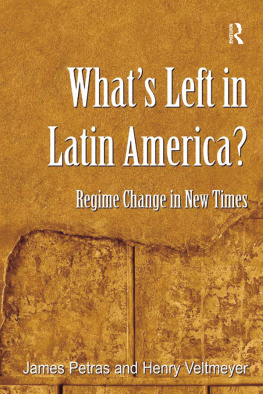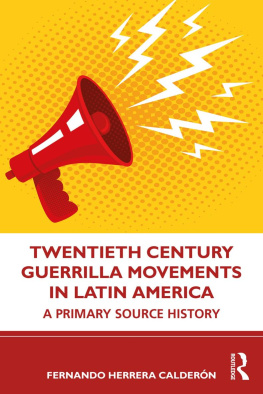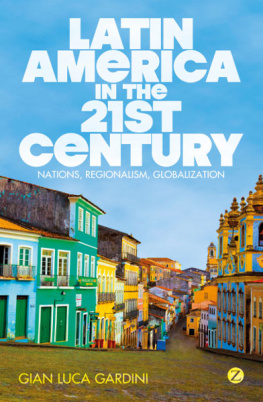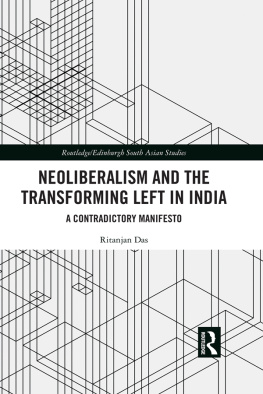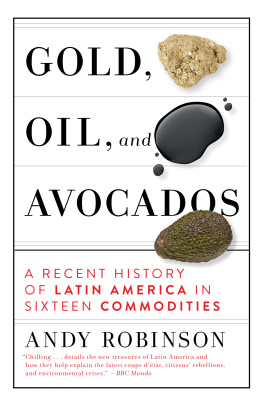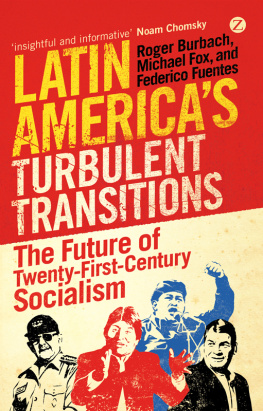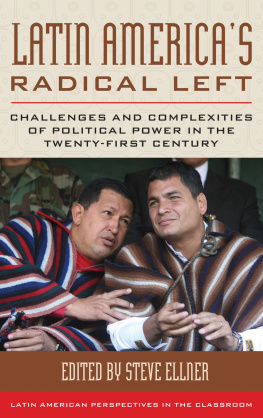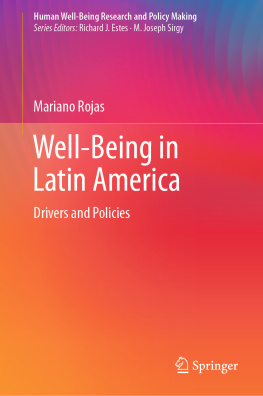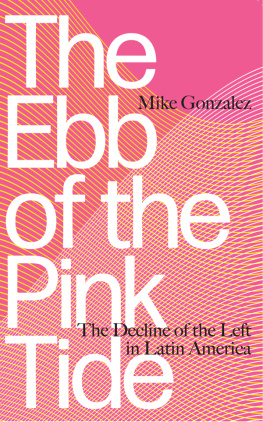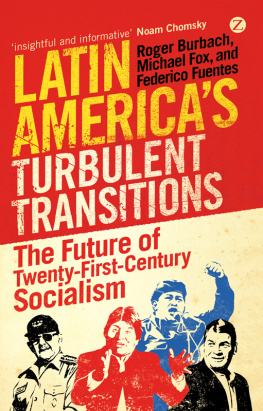WHATS LEFT IN LATIN AMERICA?
Whats Left in Latin America?
Regime Change in New Times
JAMES PETRAS
SUNY at Binghamton, US
HENRY VELTMEYER
Saint Marys University, Canada
First published 2009 by Ashgate Publishing
Published 2016 by Routledge
2 Park Square, Milton Park, Abingdon, Oxon OX14 4RN
711 Third Avenue, New York, NY 10017, USA
Routledge is an imprint of the Taylor & Francis Group, an informa business
Copyright 2009 James Petras and Henry Veltmeyer
James Petras and Henry Veltmeyer have asserted their rights under the Copyright, Designs and Patents Act, 1988, to be identified as the authors of this work.
All rights reserved. No part of this book may be reprinted or reproduced or utilised in any form or by any electronic, mechanical, or other means, now known or hereafter invented, including photocopying and recording, or in any information storage or retrieval system, without permission in writing from the publishers.
Notice:
Product or corporate names may be trademarks or registered trademarks, and are used only for identification and explanation without intent to infringe.
British Library Cataloguing in Publication Data
Petras, James F., 1937-
Whats left in Latin America? : regime change in new times. 1. Economic development--Latin America. 2. Latin America--Politics and government--1980- 3. Latin America--Economic policy--21st century. 4. Latin America--Social conditions--21st century.
I. Title II. Veltmeyer, Henry.
980.04-dc22
Library of Congress Cataloging-in-Publication Data
Petras, James F., 1937-
Whats left in Latin America? : regime change in new times / by James Petras and Henry Veltmeyer.
p. cm.
Includes bibliographical references and index.
ISBN 978-0-7546-7797-0 (hardback)
1. Latin America--Politics and government--1980- 2. Latin America--Economic policy. 3. Regime change--Latin America. I. Veltmeyer, Henry. II. Title.
JL960.P475 2009
320.98--dc22
2009005397
ISBN 978 0 7546 7797 0 (hbk)
Contents
List of Tables
Acknowledgements
The authors would like to acknowledge the financial support of the Social Sciences and Humanities Research Council of Canada (SSHRC). And of course we would be remiss if we did not acknowledge the contributions of our life partners Robin Eastman Abaya, who word-processed all of the text prepared for the book by James Petras, and Annette Wright, whose unstinting support in all kinds of ways is much appreciated. We need hardly but do add our appreciation of the professional services and support for our work provided by Ashgate as publisher, the editor assigned to the book and the production staff.
Introduction
This book concerns recent and current political developments in Latin America generally, and in Argentina, Bolivia, Cuba and Venezuela more particularly. These developments largely concern the meaning attached to a series of regimes that have recently emerged on the crest of a wave of anti-neoliberalism. Many of these interpretative accounts from the left focus on Venezuela but also on developments in Argentina. Brazil, Bolivia, Ecuador and of course Cuba which is described by Frederic Clairmont in the following terms: The economic and spiritual revolutions in Cuba are nothing short of mind-boggling that bear no comparison with any Latin American countries.
To hear tell or read these at times almost elegiac accounts and interpretations of this surge of left-tilting or centre-left regimes, Latin America is a hotbed of radical change, in the process of putting an end to the plague of neoliberalism and well on the way to bringing about another world, a more equitable form of development inspired by socialist ideals and values. Would it were so. The authors of this book are very sympathetic to the progressive meaning attached by so many on the left to recent political developments in the region, or would be if this assessment were at all realistic and accurate. Unfortunately it is not.
On the basis of recurrent visits and close study over the past three years the authors have been led to the conclusion that the enthusiastic and at times wildly optimistic accounts of recent political developments in Latin America do not accord with what seems to be actually happening. Nor are these new regimes at all what they are portrayed to be. For one thing, this red or pink tide of centre-left regimes is associated, and not coincidentally, with the retreat of the social movements on the left and a resurgence of class power on the right. For another, we found few indications of substantive change either in macroeconomic, i.e. neoliberal, policies or in their social dynamics. Thirdly, there were few indications that the social classes in the popular sector of society in any way benefited from the spurt of economic growth in the region and the reported primary commodities boom.
This common interpretation and accounts of the progressive shift in Latin American regime politics and policies include developments in Argentina, Brazil and Chile as well as Ecuador, Nicaragua, Peru, Uruguay and Paraguay, but the central focus, and the hopes and expectations regarding a turn to the left, has been on Venezuela, Bolivia and Cuba, a triad of socialist or socialist-oriented regimes painted as the nemesis of US imperialism and neoliberal globalization, the wave of an imminent and much better future.
So what is the reality of the recent and current political developments in the region? This is the aim of this book to assess the state of recent and current developments in Latin America in the new times of a global primary commodities boom and regime change; to assess, and critique, the prevailing view of these developments on the left. What has essentially transpired is the emergence of new and somewhat different political regimes in the context of a wave of anti-neoliberalism, a widespread concern for different policies and an alternative form of development, the relative decline of US power and the conjunctural advent of a primary commodities boom in the world economy. In this new and changing context we argue that what is needed are not dreams and political romance, idealistic portrayals of political developments and the leftist or centre-of-left regimes that have come to power, but a more scientific empirical and grounded analysis of these developments and a more realistic assessment of their meaning.
A critical assessment of the left today, particularly in the Latin America context, could and perhaps should begin and end with an analysis of neoliberalism, the dominant form of capitalism in the current and latest phase of world development. Over the past two decades neoliberalism has come to dominate both public and academic discourse and the modalities of the state and politics in one country after another. The ascendancy of neoliberalism occurred through a series of interconnected transformations that began with the economic turmoil of the 1970s, the rise of neoconservative government administrations and neoliberal policy regimes in the 1980s, and the extension and deepening and reform of the neoliberal model in the 1990s.
As for the apparent decline of neoliberalism in the late 1990s it occurred in the context of a growing social divide, widespread disenchantment and organized resistance in the popular sector of many class divided societies in the global south. Neoliberalism in this context came to mark an historic shift in the balance of power not just in Latin America but also all over the world, a turning point in the social forms of economic and political power and the patterns of everyday life in capitalist society.

